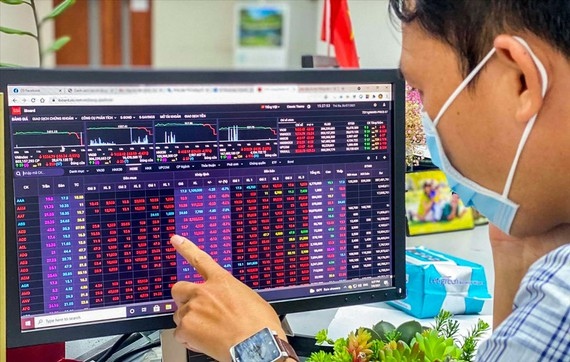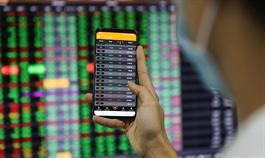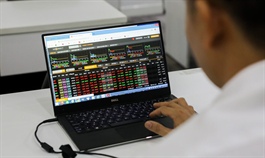Listed companies struggle to stay afloat
Listed companies struggle to stay afloat
Listed companies are pinning their hopes on a speedy recovery in the fourth quarter of the year, having had a hard time staying afloat under the severe negative impact of the fourth wave of the Covid-19 pandemic.
Ilustrative photo. |
Cash flow decrease
The month of September was considered very severe for investors due to the negative impact of the Covid-19 pandemic on the entire economy, with GDP shrinking by 6.17% in the third quarter. This is the first time Vietnam has experienced a negative GDP growth since 2000. Business activities of listed companies (LCs) also came to a halt when the supply chain was disrupted because of strict social distancing regulations enforced by the Government in the national effort to contain the spread of the disease.
Added to this, investors panicked upon news from China about Evergrande and its debt bomb fall, causing a chain reaction in the real estate sector and affecting other financial sectors as well. This resulted in changes in the global stock market and influenced the Vietnamese market too. Investors dumped banking shares because of their concern about the risk of an increase in bad debts soon after the pandemic.
The fact that the real estate sectors and banking sectors were the two key areas at the stock market that reduced their shares, was the main cause of a considerable decrease in the cash flow in the stock market. Statistics show that the average liquidity in each session on HoSE through order matching transactions in September alone reached VND 19,400 bn, a 10.7% fall compared to August. Most notably, the liquidity of the VN30 group slumped by 26% while the group of small shares rose by 16% over the previous month. The average liquidity of the entire market was VND 26,521 bn per session, a 7.9% slide over August, while the average order value fell 9.5% to VND 24,352 bn.
The negative GDP growth during the social distancing phase in Vietnam lasted until the end of September, and created a huge psychological effect on foreign investors (FIs). Statistics indicate that FIs in September sold VND 8,400 bn worth of shares through order matching transactions on HoSE. The cash flow from foreign ETF was also rather negative when FTSE and VNM ETF witnessed net withdrawals of USD 57.4 mn and USD 1 mn, respectively. Similarly, Fubon ETF also made a net withdrawal of USD 6.8 m. For domestic ETFs, FUEVFVND had USD 47.6 mn withdrawn as E1VFVN30 made a net withdrawal of USD 7.6 mn.
Rise in some sectors
Together with a negative GDP growth, third quarter sales of LCs are expected to be gloomy. Take the real estate sector for example, it usually has low sales in the third quarter. Worse still, the prolonged social distancing caused delayed sale and slowed construction activities in key areas like Ho Chi Minh City, Dong Nai, Binh Duong and Long An provinces, seriously affecting the handover plan and profit recording for the future. However, the sales of real estate LCs have not been negative, but rather saw a significant growth compared with the industrial real estate sector.
The most impressive results of the third quarter sales came from the steel sector, because of large volumes of exports of galvanized sheet metal to foreign countries like Europe and America and steel billets to China. What is special is the rise in steel prices in such markets that has helped ensure profit margins. Similarly, an enormous increase in oil and rubber prices in the international market has raised hopes for LCs in these two areas. The biggest profits must have been enjoyed by sectors benefiting from the pandemic such as retailers of consumer goods, technology and healthcare products.
Hopes set on Q4
The month of October, with focus on the third quarter financial statements, is the time for the market to measure the negative effects of the Covid-19 pandemic on business activities of all LCs. The fact that the VN Index has been shook violently by around 1,400 points in recent sessions proves that the market has been accumulating resources for a new rise in the final two months of the year.
This expectation has been based on the recovery of LCs in the fourth quarter, as social distancing regulations have been gradually relaxed since the first week of October. The estimation has come from the actual situation of the stock market in September when VN Index, though facing many challenges, was able to keep its balance partly due to the cash flow from individual investors and the self-trading division of securities companies. Statistics show that the self-trading divisions of the securities companies made net purchases of VND 1,418 bn in September.
A representative from Bao Viet Securities Joint Stock Company (BVSC) said that the reopening of the economy in the fourth quarter has been a positive element for facilitating the production and business activities of LCs. A large economic stimulus package is expected to satisfy investors, drive the market growth and push the rise in prices of shares that could benefit from this stimulus.
In addition to further public investments, the management agencies will introduce more policies in order to take advantage of private investments. Further implementation of public investments will enable LCs in construction and raw materials to attract investor attention and interest. It could be a great choice for the industrial real estate sector in the fourth quarter because this group does not benefit from increased public investments, but it may also enjoy inflow of FDI capital after a long period of strict social distancing over the last few months.
EPS at LCs is predicted to grow by 21% on HoSE in 2022. With a similar optimistic view, BVSC believes that low interest rates, the interest of domestic individual investors, and the hopes pinned on the largest ever economic stimulus package, will all play a pivotal role in determining the market trends in the fourth quarter. VN Index is very likely to gain large number of points in the fourth quarter and end the year 2021 with around 1,400 to 1,450 points.



























